Apropiación social de tecnologías digitales en un contexto de trabajo informal y precario
Contenido principal del artículo
Resumen
Objetivo - analizar, desde una perspectiva sociocultural, el proceso de apropiación social de tecnologías digitales en un taller familiar de bordado ubicado en Cuautepec, un área urbana de bajos ingresos en la periferia norte de la Ciudad de México.
Método - se realizó un diseño metodológico de tipo cualitativo, de enfoque etnográfico. Para recabar y construir los datos se utilizaron observaciones, entrevistas semi-estructuradas y demostraciones de uso de tecnología. Se analizó la forma en que los propietarios del taller tomaron decisiones sobre lo que necesitan aprender para transitar del uso de una máquina de bordar eléctrica al uso de una bordadora digital.
Resultados - la adquisición y el uso de los dispositivos digitales motivaron cambios en la distribución de tareas en el taller de bordado. El proceso de apropiación social de tecnologías digitales en un contexto laboral precario se articuló a partir de las condiciones materiales y decisiones familiares para adquirir el equipo digital, la interacción con mediadores con quienes se compartieron ideas y conocimientos sobre el uso de los dispositivos, y la participación de actores designados para usar las nuevas herramientas. Sin embargo, prevalecieron condiciones de desigualdad en el acceso a prácticas sociales con tecnologías digitales.
Limitaciones - entre las limitaciones del trabajo está la falta de profundidad en la exploración del papel de figuras que, desde la perspectiva sociocultural, son importantes en la apropiación social de tecnologías digitales, como el caso de los mediadores. Esto puede ser desarrollado de manera específica en futuras investigaciones.
Principales hallazgos - se muestra que, en el proceso de apropiación social de la tecnología, en un entorno de precariedad laboral y económica, los lazos familiares y de confianza juegan un papel relevante para compartir conocimiento y resolver problemas que se presentan en la actividad.
Descargas
Detalles del artículo
Citas en Dimensions Service
Entreciencias: Diálogos en la Sociedad del Conocimiento reconoce y respeta el derecho moral de los autores, así como la titularidad del derecho patrimonial, transferida de forma no exclusiva a la revista para su difusión en acceso abierto y su preservación, por lo que los autores que publiquen en esta revista aceptan las siguientes condiciones:
- Entreciencias: Diálogos en la Sociedad del Conocimiento por Universidad Nacional Autónoma de México se distribuye bajo una Licencia Creative Commons Atribución-NoComercial-SinDerivar 4.0 Internacional, la cual permite utilizar la información y los metadatos sin fines comerciales siempre y cuando se realice la citación correspondiente.
- Los autores tendrán el derecho de realizar la distribución no exclusiva de la contribución publicada en Entreciencias: Diálogos en la Sociedad del Conocimiento, es decir, podrán incluirlo en un repositorio institucional o darlo a conocer en otros medios digitales o impresos, siempre y cuando se indique que el artículo fue publicado por primera vez en Entreciencias: Diálogos en la Sociedad del Conocimiento, y además se incluyan datos como: autor de correspondencia, año, volumen, número de páginas, paginación electrónica y DOI.
- Los autores cuyas contribuciones sean aceptadas para su publicación deberán enviar la Carta de Cesión de Derechos en el formato llenado y firmado según corresponda, es decir, de un autor, o de dos o más autores.





